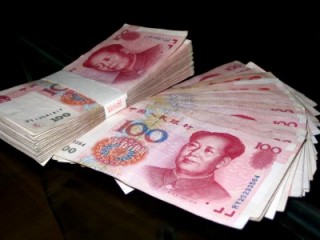 Politically, China is an easy punching bag. But the yuan, the Chinese currency, and China’s human rights record are easier to talk about than to do anything.
Politically, China is an easy punching bag. But the yuan, the Chinese currency, and China’s human rights record are easier to talk about than to do anything.
Kevin G. Hall and Nancy A. Youssef | McClatchy Newspapers
WASHINGTON _ In a surprise announcement, Treasury Secretary Timothy Geithner said Saturday that he was delaying for three months the much-anticipated decision on whether or not to brand China a currency manipulator.Geithner was poised to make the announcement before an April 15 deadline that requires the agency to annually report to Congress about nations that artificially value their currency to the disadvantage of U.S. companies.
Democrats in Congress and even trade advocates have for weeks demanded that the Obama administration take action against China. They say the undervalued yuan hurts both U.S. exports to China and makes Chinese products unfairly cheap here.
‘There are a series of very important high-level meetings over the next three months that will be critical to bringing about policies that will help create a stronger, more sustainable, and more balanced global economy,’ Geithner said in a statement, promising to press China in three high-profile meetings. ‘I believe these meetings are the best avenue for advancing U.S. interests at this time.’
Geithner’s statement comes just two days after Beijing announced that Chinese President Hu Jintao will attend a nuclear security summit meeting in Washington April 12-13. Even as the United States seeks to curb China’s currency rate setting, it also needs China’s support for U.N.-backed sanctions against Iran and its nuclear ambitions, and Geithner’s announcement appeared to be timed before Hu’s arrival.
Saturday’s announcement by Geithner gives China a way to address U.S. concerns while saving face. It avoids a decision made under an embarrassing deadline.
China repeatedly has denied its exchange rate is fixed to the disadvantage of foreign competitors. But economists in the United States and Europe believe currency manipulation explains why China continues to have such a large trade surplus with most of the developed world.
China is facing mounting international pressure from not only the United States but Europe to show more flexibility on the currency issue. When the world economy was booming, countries were willing to tolerate job losses to cheaper Chinese imports. But today, the focus almost everywhere is on keeping and creating jobs, and nations cannot afford to lose jobs to China they way they could two years ago.
In addition, U.S. policymakers had resisted branding China as a currency manipulator, fearing it would stop China from buying U.S. government debt. China and Japan rival each other as the largest purchaser of U.S. debt.
But in recent weeks, even the staunchest of free trade advocates have condemned Chinese currency practices as harmful to U.S. jobs. These include C. Fred Bergsten, director of the Peterson Institute for International Economics, who believes China’s fixed exchange rate is costing America at least 1.5 million jobs.
Pressure was building in Congress for action against China. Sen. Charles Schumer, D-N.Y., is advancing bipartisan legislation to get tough with China. In the House of Representatives, the Ways and Means Committee, which has jurisdiction over trade issues, is now headed by a free trade opponent, Rep. Sander Levin, D-Mich.
In a statement Saturday, Schumer vowed to push through with his legislation, saying in a statement: ‘After five years of stonewalling, punctuated by occasional, but halting, action by the Chinese, we have lost faith in bilateral negotiations on this issue.’
Sen. Chuck Grassley, R-Iowa, the ranking member of the Senate Finance Committee, said he was disappointed about the delay.
‘Everyone knows China is manipulating the value of its currency to gain an unfair advantage in international trade,’ he said. ‘If we want the Chinese to take us seriously, we need to be willing to say so in public. The past few years have proven that denying the problem doesn’t solve anything.’
Geithner said China is not alone in needing to reduce its large trade surplus with the United States.
‘Countries with large external surpluses and floating exchange rates, such as Germany and Japan, face the challenge of encouraging more robust growth of domestic demand,’ he said. ‘Surplus economies with inflexible exchange rates should contribute to high and sustained global growth and rebalancing by combining policy efforts to strengthen domestic demand with greater exchange rate flexibility. This is especially true in China.’
In recent years, China has allowed its yuan to trade in a wider band against the dollar, hovering around 6.83 yuan to the dollar. Most nations let the markets set the value of their currencies against other currencies. China is one of the few that fixes its currency rate.
Earlier this week, Geithner visited a metals factory in Pittsburgh and met with representatives of United Steelworkers and U.S. Steel; many viewed the trip as a signal from the administration that it was going to take action against China. Steelmakers, big and small, complain of competing unfairly with Chinese imports. The secretary is scheduled to visit China’s neighbor and competitor, India, on Sunday.
There are series of meetings where key world economic leaders will likely address the issue again. They include two gatherings of finance ministers from the world’s 20 most industrialized nations _ the G-20 _ in Washington this month and in June; and a meeting of Strategic and Economic Dialogue with China in May. This dialogue was launched by the Bush administration to prod China on its currency and a host of other trade irritants. These include barriers to U.S. exports, government purchasing in China that discriminates against U.S.-made products and China’s failure to protect patents and copyright.
ATTENTION READERS
We See The World From All Sides and Want YOU To Be Fully InformedIn fact, intentional disinformation is a disgraceful scourge in media today. So to assuage any possible errant incorrect information posted herein, we strongly encourage you to seek corroboration from other non-VT sources before forming an educated opinion.
About VT - Policies & Disclosures - Comment Policy



